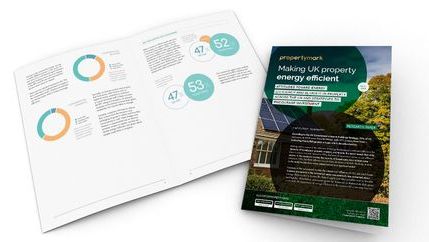
As the UK Government continues to shape the future of the EPB regime, Propertymark urges policymakers to work closely with agents and landlords. Reforms must be clear, achievable, and aligned with upcoming changes to Minimum Energy Efficiency Standards (MEES). We are committed to working with stakeholders to raise awareness and ensure that reforms deliver improved energy performance without unintended consequences.
Making UK property energy efficient
Financial implications, practicality, consequences, and communication surrounding energy efficiency measures are key concerns cited in Propertymark’s latest report which provides recommendations to help homeowners, landlords, and tenants save money, create new jobs and fight climate change.
Supporting clearer, more frequent EPCs
We support the move to reduce the validity of EPCs from ten to five years. This change would better reflect the current energy performance of properties and ensure certificates remain up to date. We also back the requirement for a new EPC when the current one expires in the private rented sector but emphasise that changes must be well promoted and phased in, with a grace period for enforcement focused on education rather than penalties.
We agree with providing more granular and practical data on EPCs, including:
- Energy cost metrics to help consumers understand financial implications.
- Fabric performance metrics to highlight the importance of insulation and structure.
- Heating system metrics to support a transition to cleaner energy, provided fabric upgrades are prioritised first.
- Energy use metrics, using delivered energy as a user-friendly measure.
However, we are cautious about the introduction of carbon metrics and smart readiness data at this stage, particularly where smart meter uptake remains limited.
A tailored approach for non-domestic buildings
The UK Government must take a more tailored approach to EPC reform for non-domestic buildings, recognising that commercial property presents fundamentally different challenges to domestic stock.
We support maintaining separate performance metrics—Energy Efficiency Ratings (EER) for homes and Environmental Impact Ratings (EIR) for commercial premises. The complexity and diversity of non-domestic buildings, from offices to warehouses, means a single methodology would fail to capture their true energy performance or offer useful recommendations.
We have also highlighted a significant compliance issue around leasehold responsibility. In many commercial leases, tenants are responsible for maintenance but not energy upgrades. As MEES requirements become more stringent, this could lead to disputes and uncertainty over who is liable for improvements at lease end.
To be effective, EPC reforms must provide clear guidance on responsibilities, maintain high standards of assessment, and offer practical, sector-specific recommendations. Crucially, landlords, tenants, and agents must be supported with clear information to help them understand and act on the changes.
We will continue to work with the UK Government to ensure the commercial property sector is treated fairly and that reforms support energy efficiency without introducing unreasonable burdens or confusion.
Protections for HMOs and heritage buildings
We strongly disagree with requiring EPCs for individual rooms in HMOs that currently fall outside the scope of the Minimum Energy Efficiency Standards (MEES). HMOs are a vital part of the UK’s affordable housing supply, typically serving low-income and vulnerable tenants. Imposing room-level EPC requirements would increase both costs and administrative pressures on landlords, many of whom already face tight margins.
Similarly, we oppose removing EPC exemptions for buildings officially protected due to their architectural or historical merit — including listed buildings and those in conservation areas. While we support the principle that all properties should strive for better energy performance, these buildings face unique constraints around structural restrictions, cost, and expertise. The lack of grants or tax relief for energy upgrades in heritage properties also makes retrofitting financially unviable for many owners. Mandating EPCs without addressing these barriers risks damaging the character of historic buildings and deterring owners from making any improvements.
Level playing field for short-term lets
Propertymark agrees that short-term rental properties should be required to have a valid EPC at the point of being let, regardless of who pays the energy bills. This is an essential step towards creating a level playing field between the short-term and long-term rental markets.
Short-term lets—such as holiday rentals and serviced accommodation—have grown rapidly in recent years, often operating outside the regulatory framework that governs the PRS. Aligning the energy performance obligations of short-term lets with the rest of the rental market would support greater consistency for landlords, agents and consumers. It would also pave the way for the implementation of measures introduced under the Levelling-up and Regeneration Act 2023, which includes provisions for a national register of short-term lets.
Improving EPC quality and compliance
Propertymark has called for improved quality control of EPC assessments. While we are open to Accreditation Schemes having more responsibility, the UK Government must first review the supply of assessors and strengthen auditing processes. Only then can consumers gain confidence in the EPC system.
We have also proposed introducing a formal error reporting mechanism, increasing penalties for non-compliance in line with inflation, and ensuring better data sharing and transparency.










